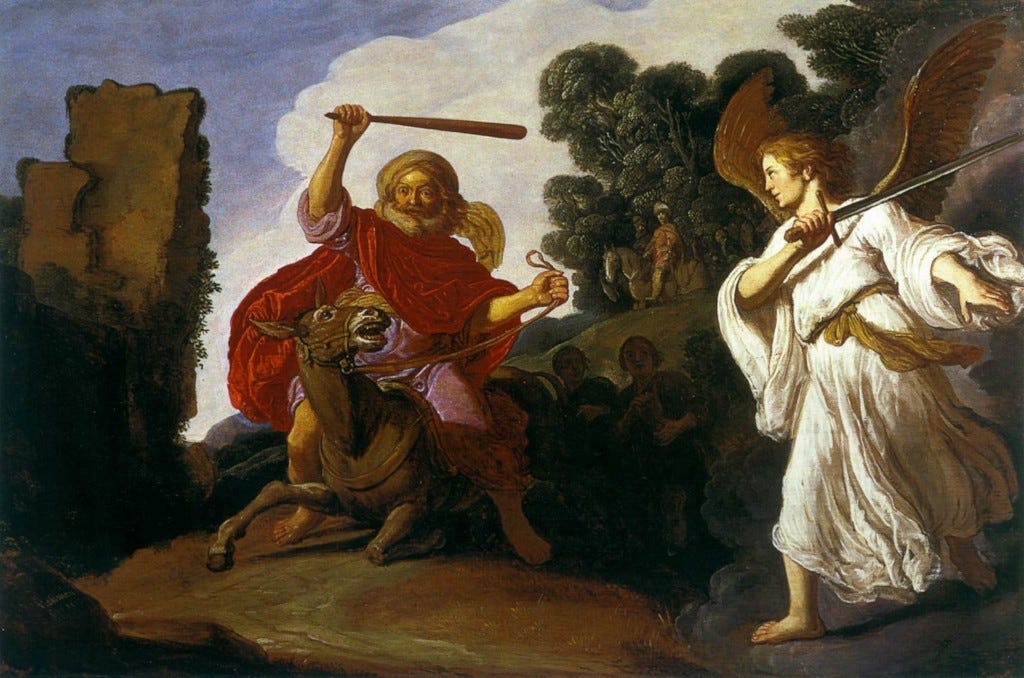
וַתֹּ֨אמֶר הָאָת֜וֹן אֶל־בִּלְעָ֗ם הֲלוֹא֩ אָנֹכִ֨י אֲתֹֽנְךָ֜ אֲשֶׁר־רָכַ֣בְתָּ עָלַ֗י מֵעֽוֹדְךָ֙ עַד־הַיּ֣וֹם הַזֶּ֔ה הַֽהַסְכֵּ֣ן הִסְכַּ֔נְתִּי לַעֲשׂ֥וֹת לְךָ֖ כֹּ֑ה וַיֹּ֖אמֶר לֹֽא׃
The ass said to Balaam, “Look, I am the ass that you have been riding all along until this day! Have I been in the habit of doing thus to you?” And he answered, “No.”
Gimme Some Torah #745
God could have stopped Bilaam very easily—the Holy One could have simply killed him instantly, and that would have been the end of the story. Instead, God creates a kind of spiritual Rube Goldberg machine to mess with Bilaam in a convoluted way. The Eternal even throws in a talking donkey and an angel for good measure!
Why did God not just smoke Bilaam early on? The Or HaHayim suggests that the Holy One’s intent was to humiliate Bilaam as much as possible. It was not enough to stop Bilaam—God caused the wizard’s arrogance to implode in a spectacular fashion. Here is what R. Haim ibn Attar (Or HaHayim) says on this point:
After the ass had seen the angel for a third time it became equipped with the power to speak similar to a human being. As soon as this had occurred it opened its mouth, spoke intelligently and put Bileam to shame as a result. It actually put down Bileam in the presence of his assistants. The shame resulting from this occurrence was twofold and left a deep impression. 1) The ability of the animal to speak. 2) The revelation that Bileam the great prophet had been in the habit of using his she-ass as one uses a wife, i.e. as his sexual mate.
Rashi says that God arranged for the donkey to catch Bilaam in an embarrassing lie. He quotes the Talmud (B. Avodah Zarah 4b), which describes the humiliating incident:
And our Rabbis have explained this verse in the Talmud: They said to him, “What is the reason you are not riding on a horse?” He replied to them: “I have left it in the meadow grass” (i.e., I have put it out to graze). Whereupon the ass exclaimed: Am I not your ass upon whom thou hast ridden from my very youth unto this day?!” (so you see, you have never possessed a horse) — as it is related in Treatise Avodah Zarah 4b.
Humiliation is an extremely powerful weapon; Israel successfully used it for good in the pager attack on Hezbollah terrorists. Humiliation is also very dangerous and can be easily used for immoral purposes.
For instance, Mikayla Raines, the autistic founder of Save a Fox rescue, died by suicide last month after enduring an online bullying campaign. Mikayla’s harassers were spreading a vicious, untrue rumor that she was having sexual relations with the foxes she saved. Her autism may have made it difficult for her to ignore or fight the slander.
Mikayla Raines is just one example of people who have killed themselves or who have seen their lives destroyed in the wake of online humiliation.
•••
Thank you so much for reading Gimme Some Torah! If you can afford to purchase a paid subscription, please do—paid subscribers get access to the entire GST library!
I am the rabbi of Temple Beth El in Somerset, New Jersey, and the author of The JPS Jewish Heritage Torah Commentary.


